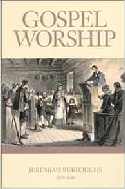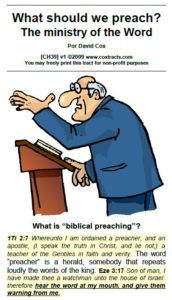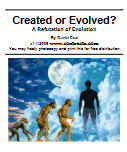Ads
Gal 1:6 I marvel that ye are so soon removed from him that called you into the grace of Christ unto another gospel: 7 Which is not another; but there be some that trouble you, and would pervert the gospel of Christ. 8 But though we, or an angel from heaven, preach any other gospel unto you than that which we have preached unto you, let him be accursed. 9 As we said before, so say I now again, If any [man] preach any other gospel unto you than that ye have received, let him be accursed.
When we refer to “our gospel”, this the is “good news” which is always on the tip of our tongue, which we are already ready and willing to share with others. The Calvinist will strongly deny that he has any other gospel other than that found in the Bible, but this is what he says to defend himself. In reality, he preaches “another gospel.”
Contents [hide]
The Doctrines of Grace
The “watchword” or watch phrase among Calvinists is, do you believe in and promote the “doctrines of grace”. For the Calvinist, this means orthodoxy or heresy. Anybody who lightly recommends “the doctrines of Grace”, or worse, denounces the doctrines of Grace, well they must be a heretic 7 times over. In a future study we will examine extensively what the Bible teaches about Grace. But for the moment, let us ask ourselves a question, “Is the gospel and the doctrines of grace the same thing?” Most well developed Calvinists would quickly answer, “no, they are different.” Well, they are different.
For the Calvinist, the “doctrines of grace” are principally the doctrine of election, with the cluster of the Tulip doctrines around it. This is the “good news” that the Calvinist announces when he announces something. But is this the Gospel of the New Testament?
The True Gospel of the New Testament
1Cor 15:1 Moreover, brethren, I declare unto you the gospel which I preached unto you, which also ye have received, and wherein ye stand; 2 By which also ye are saved, if ye keep in memory what I preached unto you, unless ye have believed in vain. 3 For I delivered unto you first of all that which I also received, how that Christ died for our sins according to the scriptures; 4 And that he was buried, and that he rose again the third day according to the scriptures: 5 And that he was seen of Cephas, then of the twelve:
The Gospel as Paul understood it is the death, burial, and resurrection of Jesus Christ for our sins. There is no election in this gospel. There is no irresistible grace. There is nothing similar to the TULIP doctrines in this gospel. The gospel of the NT, the gospel which Jesus, the apostles, and the disciples constantly announced was the death, burial, and resurrection of Jesus Christ for our sins.
Why is it correct for the Calvinist to stop promoting this biblical gospel to focus on “the Doctrines of Grace”? It is like the Jehovah’s Witnesses who leave off this true Gospel to preach the end times, the rise of the Antichrist, etc. It is like the Pentecostal-Charismatic who likewise abandons this gospel for the experience of the Holy Spirit’s baptism. While some of what the Jehovah’s Witnesses and Pentecostals teach does have some biblical truth to it, it is simply wrong and satanic to announce that as the gospel instead of the true gospel.
Moreover, Calvinism declares the doctrine of perdition, which throughout its shady history most strong Calvinistic authors, writers, and preachers have sworn allegiance to this false doctrine, but in times past, it seems as though their books and teaching on this subject was simply not put forth so publically because “it was too strong for most people.” Here we understand why, because there would be a strong reaction among true Christians against all Calvinists. It is disappointing that today this doctrine of perdition is coming out very loud and strong.
STUDY: The Doctrine of Perdition
Briefly the doctrine of perdition is the doctrine or belief that God has decided who will not be saved (the vast majority of humanity), and there is nothing that they can do to be saved, even if they wanted to. The idea behind this is simply, God has elected some to salvation, and in God’s will, He has desired the destruction in hell of the majority of all humanity, and this being the absolute will of God, nobody can in any wise change this.
Are the Gospels saturated with the Doctrines of Grace?
This is a valid question. If the Calvinist is right, then the doctrines of grace should be found excessively throughout the Gospels and Acts, and throughout the rest of the NT. If this gospel is what they preached and taught and defended and championed literally “with their lives”, then it should be very obvious and simple to prove.
The word “election” doesn’t occur in the Gospels
While the Calvinist cannot move on to other doctrines beside “election”, the actual word “election” isn’t even found in the Gospels or Acts at all. In fact, in the entire Bible, the word “election” only occurs 6 times. This is a great hardship on the Calvinist, because it is his gospel, but the NT is not saturated with the concept at every turn as we would think if it is the same thing as “the Gospel.” Moreover, the Gospels just don’t seem to have the concept with frequency.
Even the word “elect” only occurs 7 times in the Gospels (none in Acts), and it refers to a group, like the “redeemed”, or “the church”, or “the body of Christ.” This teaching is very sketchy at best in the gospels.
Election is never presented to the unsaved
The fact that election is never presented to an unsaved group or person in Scripture should be intensively mediated upon. Why not? Because it is not the gospel we are to present. The teaching of election (especially as the Calvinist presents it, some are elect and will be saved, and the rest, tough luck) is a deterant or discourages the unsaved from coming to Christ, and in no way encourages him to come to Christ. First of all, who are the elect? Am I an elect? The entire subject of election causes confusion, doubt, and represses the sinner from repentance and faith in Christ. It removes the obligation and need from accepting Christ from his shoulders, and makes him spiritually apathetic to his own sinful state.
Election will never get people saved if that is what is your gospel. In the Scriptures, election is a topic which God brings up with his children when they are undergoing or about to undergo persecution and suffering, and the idea of election is that they are special people in God’s consideration, and even the bad that will happen to them is approved and permitted by God because of this favored state before Him.
The Calvinist understands his problem, that election just isn’t a prominent doctrine of Scripture (which is why Satan has chosen this doctrine, so that he can redefine it and twist it into what he wants). So the Calvinist drops “election” as his primary push, at least in studying the passages where the word occurs, and redefines the gospel as “the doctrines of grace”.
So we ask the question again, is the doctrine of grace the same as the gospel in the NT and Acts? No. The concept of grace is one of giving, and the emphasis is not on selecting to whom the gift will be given, even though that concept has to be there, but the concept of grace is on the gift freely given. This is grace. To give a gift. The focus is not on whom, as much as being principally on giving.
So we search the Gospels for the concept of grace and the word “grace.” “Grace” occurs 15 times in the Gospels (if you search on the Greek word xaris G5485 it occurs another 12 times “favour”).
Luke 2:40; 4:22; John 1:14, 16-17; Acts 4:33; 11:23; 13:43; 14:3, 26; 15:11, 40; 18:27; 20:24, 32
Now is this a saturation of the idea in the Gospels as their principal theme? Matthew and Mark don’t even have the word occurring at all? Isn’t it strange that the Greek word xaris (grace) doesn’t even once occur in two of the Gospels? This is the heart of the Gospel?
Let’s look at some other frequencies in the Gospels and Acts:
repent – 38x
faith – 56x
believe – 161x
If the Gospel which we preach, focus on, concentrate on, and which we make central to our Christianity is election, then somehow God must have forget to make it the central teaching and preaching of the Gospels and Acts. Obviously God did what He knows is right, and the Calvinist is just all messed up and off home base.
Let’s look at the 27 times that grace is mentioned to see if it is obviously referring to election to salvation and election to perdition. I will arrange and group these to make this easier to digest.
Favor with God
Favor with God is not election (the person having nothing to do with it as per the Calvinist concept), but it speaks of the piety and holiness in the person (such as Mary’s selection to bear the Messiah because she had piety and holiness), and God’s reaction to that person’s life as being favorable, or giving blessings to that person. This really has nothing to do with election nor salvation. It has everything to do with God blessing a person because of what he is. The Calvinist wants us to think election is a predetermined selection by God not having anything to do with nothing the person to gain God’s favor, but that is not the concept of grace in the Gospels and Acts. God’s favor on a person’s life is directly linked to his obedience and the intensity of that obedience. It is not cut off and completely without any regard to what the man is (his character), nor broken and separated from what he does (his actions). The Calvinist wants to drill “total inability” into our heads at every turn, but this is just not a biblical concept.
Luke 1:30 – Angel to Mary about her selection as the woman who is to be Jesus’ mother. Nothing about Mary’s election to salvation here really. “hast found favor with God“. Why did Mary find favour with God? Was it related to what she was and how she directed her life before God? Or is the grace of God given to harlots and fornicators irrespective of their character and actions? No. Mary was holy, and because of her character and being, her holy lifestyle, the grace of God came upon her. Grace is not linked to a selection by God without any reference to what the person is morally. Just the opposite, God’s blessing comes to a person because they morally conform themselves to God’s will.
Luke 2:40 the grace of God was on Jesus.
Luke 2:52 Jesus increased in favour with God and man.
John 1:14 And the Word was made flesh, and dwelt among us, (and we beheld his glory, the glory as of the only begotten of the Father,) full of grace* and truth. 15 John bare witness of him, and cried, saying, This was he of whom I spake, He that cometh after me is preferred before me: for he was before me. 16 And of his fulness have all we received, and grace* for grace*. 17 For the law was given by Moses, [but] grace* and truth came by Jesus Christ. John 1:14-16 has “grace” 4x, and again it speaks of Jesus’ grace. There is no election concept in this passage, but the gift concept.
Acts 4:33 “great grace was upon (the apostles)”
Acts 7:46 David found favour before God.
Acts 13:43 Paul and Barnabas persuaded the Jewish converts to “continue in the grace of God.” The concept here fits more in the idea of “favor of God”, rather than salvation of God.
Acts 14:26 “they had been recommended to the grace of God for the work which they fulfilled” The idea here is more favor of God. “Recommended” is to give oneself over to something, and this is not referring directly to salvation, but in general to ministry.
Acts 15:40 “And Paul chose Silas, and departed, being recommended by the brethren unto the grace of God.”
Favor with man
Luke 2:52 Jesus increased in favour with God and man.
Acts 2:47 “having favour with all the people”.
Acts 7:10 Joseph found favour in the sight of Pharaoh.
Acts 24:27 Felix “willing to shew the Jews a favor“.
Acts 25:3 Felix “desired favor against him”
Acts 25:9 Festus “willing to do the Jews a favor.”
A Gracious thing
The idea of, for example, “gracious words”, is not election or salvation, but rather, words which engender a favorable attitude of others towards oneself. Grace here is obviously something that the person receiving the favor does or is, and this causes the favor to be bestowed on him. This is starkly opposite of Calvinism’s definition of grace.
Luke 4:22 the gracious words that proceeded out of the mouth of Jesus.
Gratitude
Gratitude is another translation or rendering of the charis concept. Similar to the concept of “graciousness” and “favor” where the character of a person provokes blessing, access, and benefit from another, having gratitude is the counterpart of favour. It is the correct and biblical response to grace (a favorable disposition from somebody). Again, this is far from the Calvinist concept of election as it can be. Gratitude is in or on the side of the person receiving, not the giver.
Luke 6:32 For if ye love them which love you, what thank (grace) have ye? for sinners also love those that love them. 33 And if ye do good to them which do good to you, what thank have ye? for sinners also do even the same. (verse 34 again in the same context)
Luke 17:9 Doth he thank (grace) that servant?
Grace related to salvation
Acts 11:23 Barnabas “had seen the grace of God, was glad”
Acts 14:3 “the word of grace“
Acts 15:11 “But we believe that through the grace of the Lord Jesus Christ we shall be saved, even as they.”
Acts 18:27 “And when he was disposed to pass into Achaia, the brethren wrote, exhorting the disciples to receive him: who, when he was come, helped them much which had believed through grace:”
Acts 20:24 But none of these things move me, neither count I my life dear unto myself, so that I might finish my course with joy, and the ministry, which I have received of the Lord Jesus, to testify the gospel of the grace of God.
Acts 20:32 And now, brethren, I commend you to God, and to the word of his grace, which is able to build you up, and to give you an inheritance among all them which are sanctified.
Conclusion
When the Calvinist starts talking about the “doctrines of grace”, his mind is set upon election and perdition. Grace to a Calvinist is the same thing as election. This is the principle concept in his mind if he honestly defines “grace.” If the Gospels and Acts presents to us the “gospel”, then what is this gospel? Is it principally and emphatically election? The Word of God does not indicate this. The Gospel rests upon repentance and faith in Jesus Christ, both of which God calls upon us (sinful humans) to “do this” as a condition of being saved.
Effectively the Calvinist has changed the Gospel he proclaims from the truth of God’s Word to the error of “majoring on the minors”, and thus leading astray generations of people. But these Calvinists are so forceful in their arguments and strongly persuasive in their debates, that “”insomuch that, if [it were] possible, they shall deceive the very elect” (Mat 24:24).

Burroughs Gospel Worship 14 chapters (263 pages) which are each a sermon on how to properly worship God. (format PDF)
“Jeremiah Burroughs’ Gospel Worship has greatly influenced my understanding of biblical worship. It is one of the most important books I have ever read.”
–R.C. Sproul
Download: Burroughs Gospel Worship.








Very good attack on the “Doctrines of Hatred”.